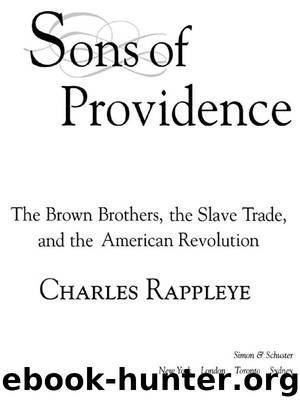Sons of Providence by Charles Rappleye

Author:Charles Rappleye
Language: eng
Format: epub
Publisher: Simon & Schuster
Philadelphia in 1775 was the largest city in America, more than ten times the size of Providence, with wharves that stretched two miles along the shore of the Delaware River. Its broad streets were crowded with throngs of people and scores of farm wagons that rolled into town for the twice-weekly market days, but John was spared the disorienting confusion of the first-time visitor. He’d stopped at the Quaker capital several times in his early trading days, and could rely on a close friendship with Tench Francis, a wealthy merchant and former business agent for the family firm, for contacts at the highest levels of Philadelphia society. He could also count on a warm reception from Rhode Island’s delegates to Congress—Stephen Hopkins, whom John had served as a political lieutenant, and who was still an active partner at the Hope Furnace, and Samuel Ward.
Hopkins and Ward were both aged and increasingly infirm, having spent their best years fighting each other in the Rhode Island gubernatorial wars. But now they were partners, leading patriots in the Continental Congress, and together they had laid the groundwork for the business that called John to the city. From the time it first met, in September 1774, the Congress moved carefully, still hoping to find some path to rapprochement with Britain. But in June 1775, after the fighting at Lexington and Concord, it authorized formation of an army. That October, returning from a summer recess, Hopkins and Ward presented a resolution from the Rhode Island General Assembly calling for creation of a Continental Navy.
The plan was roundly denounced, especially by the southern delegates, “as the most wild, visionary, mad project that has ever been imagined”—and perhaps it was, considering the primacy of the Royal Navy and the time and expense that would be necessary to build and outfit a fleet. But its sponsors were widely respected—his peers elected Ward chairman of the Committee of the Whole—and the delegates could not ignore continued depredations by the likes of Captain Wallace. By the end of October, the Congress agreed to build four ships and established a Naval Committee to supervise the effort. The roster included John Adams, whose ardor for the navy became a lifelong passion, John Langdon, a merchant and former sea captain from Portsmouth, New Hampshire, and Stephen Hopkins.
It was on the committee that Hopkins made his influence felt, charming his colleagues with his wisdom and his homespun intellect. Business was conducted after hours in the warmth of a waterfront tavern, where Hopkins held court from under the broad brim of his Quaker hat. “Governor Hopkins…kept us all alive,” Adams memorialized in his diary. “He kept us in conversation till eleven and sometimes twelve o’clock. His custom was to drink nothing all day nor til eight o’clock…and then his beverage was Jamaica spirit and water. It gave him wit, humor, anecdotes, science and learning. He had read Greek, Roman and British history…and the flow of his soul made all his reading our own.”
Tellingly, on November
Download
This site does not store any files on its server. We only index and link to content provided by other sites. Please contact the content providers to delete copyright contents if any and email us, we'll remove relevant links or contents immediately.
| American Revolution | Civil War |
| US Presidents |
Fanny Burney by Claire Harman(25778)
Empire of the Sikhs by Patwant Singh(22163)
Out of India by Michael Foss(16309)
Leonardo da Vinci by Walter Isaacson(11895)
Small Great Things by Jodi Picoult(6085)
The Six Wives Of Henry VIII (WOMEN IN HISTORY) by Fraser Antonia(4784)
The Wind in My Hair by Masih Alinejad(4420)
The Lonely City by Olivia Laing(4112)
The Crown by Robert Lacey(4099)
A Higher Loyalty: Truth, Lies, and Leadership by James Comey(4024)
The Iron Duke by The Iron Duke(3636)
Millionaire: The Philanderer, Gambler, and Duelist Who Invented Modern Finance by Janet Gleeson(3565)
Sticky Fingers by Joe Hagan(3449)
Alive: The Story of the Andes Survivors by Piers Paul Read(3302)
Papillon (English) by Henri Charrière(3264)
Joan of Arc by Mary Gordon(3253)
Stalin by Stephen Kotkin(3081)
Aleister Crowley: The Biography by Tobias Churton(3015)
Ants Among Elephants by Sujatha Gidla(2920)
